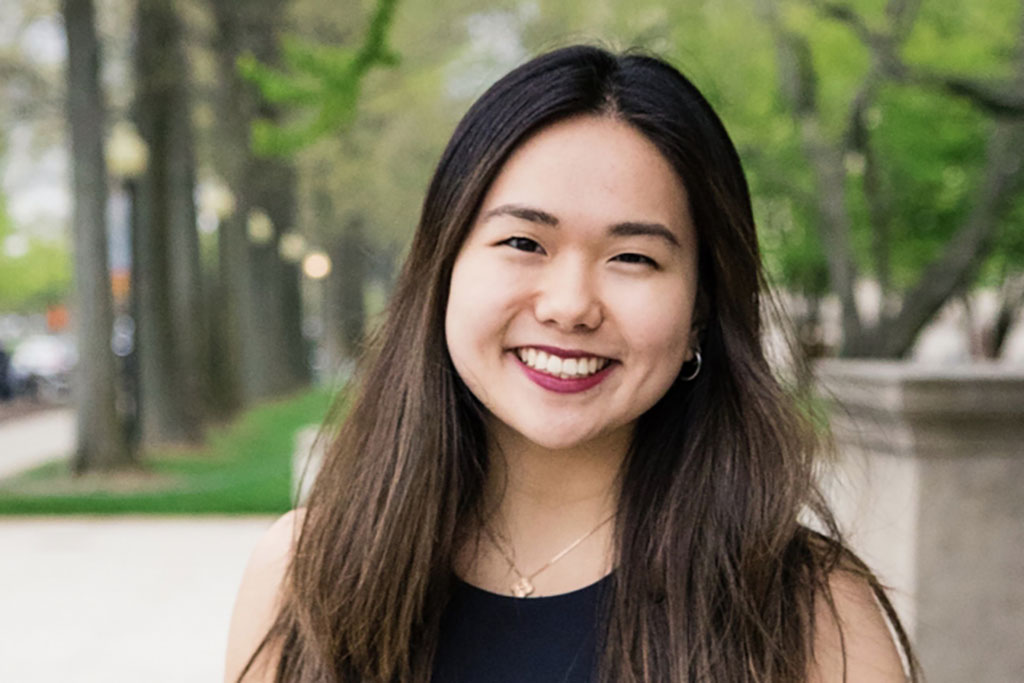Meet the MIT bilinguals: Claudia Chen '20 combines creative, humanistic, and technical fields
Claudia Chen ’20 was building automata at MIT long before she even submitted her application for admission. As a rising senior in high school, she participated in MIT’s Women’s Technology Program (WTP) and used her time in the Pappalardo lab in part to build a laser-cut kinetic sculpture. That project, which mingled the artistic and the technical, foreshadowed the wide range of studies she would explore as an undergraduate student at the Institute.
As a creative writing enthusiast and lifelong dancer, Chen wasn’t sure what type of degree she wanted to pursue. But inspired by WTP and her hands-on lab experience, Chen applied to MIT, planning on Course 2 (mechanical engineering, or MechE). And Chen soon discovered the Institute’s deep resources in the humanistic and creative disciplines, and realized that, at MIT, she could advance in all the areas important to her: combining studies in the creative, humanistic, and technical fields.
STEM from Dance
Chen first became interested in comparative media studies (CMS) because of the education classes on offer. “Education has been a topic that’s interested me my whole life,” Chen reflects. She dove into CMS classes on educational technology, such as Design and Development of Games for Learning, Education Technology Studio, and Learning Media and Technology.
“My favorite part about studying CMS has been the diverse people and diverse opportunities I’ve been introduced to,” says Chen. Those opportunities included externing twice at STEM From Dance, a nonprofit organization in the New York City area that introduces women of color from disadvantaged communities to programming and engineering. “Working at STEM From Dance was one of the highlights of my time at MIT,” Chen says, “I’m so thankful I had the background and knowledge from my CMS classes to take to that externship.”
STEM From Dance, led by a fellow MIT Course 2 alumna, was the perfect confluence of Chen’s fascination with education, her budding life as an engineer, and her passion for dance. During her time at MIT, she continued to dance with DanceTroupe, one of MIT’s largest dance organizations, and with Fixation, a competitive contemporary dance group, which she served as president.
In time, Chen declared a major in CMS along with her original MechE track. “As a mechanical engineering student, I think about technical solutions to our world’s biggest problems,” she says. “As a CMS student, I think about the effects and implications these technical solutions have on our society and our media ecosystems. Studying the humanities has given me the opportunity to tap into bodies of literature and schools of thought that are not addressed in my tech classes, and has taught me to think critically, to analyze and evaluate issues, including those involving technology.”
Effects on the future
Chen also undertook a research project in the Center for Civic Media, a joint program of the Comparative Media Studies Program/Writing and the Media Lab, constructing an ethnography on journalists who report on hate speech and mis- and dis-information.
In her post-MIT life, Chen plans to move to Seattle and begin a position at Microsoft on the same team with which she interned last summer, developing a mobile device with a 360-degree hinge. In the short term, she’s excited to be expanding her skills technically as a mechanical engineer in a professional environment, and to bring her CMS knowledge to bear in thinking critically about the technology she develops.
“Studying the humanities has made me a more thoughtful engineer,” Chen says. “Because many of my CMS classes have involved looking back in time and reflecting on what has and what hasn’t worked, I’ve become much more aware of the potential effects my own work might have on the future.”
Chen will also take the humanities with her in another way. The daughter of Chinese immigrants, Chen took courses for Chinese language speakers through the MIT Global Studies and Languages Section. In her role at Microsoft, she will use that language training to communicate with suppliers on her travels.
The best part of MIT
Her nontraditional senior spring, completed from her hometown of Overland Park, Kansas, brought home what has been so special about her MIT experience. “I know it’s very cheesy when people say ‘The best part of MIT are the people,’” she laughs, “but being away from campus and all the MIT people this spring has really brought home that it’s true.”
Chen graduated with a profound sense of what she can accomplish and overcome as part of a strong community. The rigor of the MIT education is only one factor that has given Chen the courage to overcome challenges and uncertainties.
“My favorite part about being at MIT,” she says, “has been developing confidence with the help of other people. Along the way, when I wasn’t sure if I could finish a p-set or a project or get an internship or do something I’d never done before — each time there were my friends, classmates, professors, staff, and instructors who helped me along the way.”

